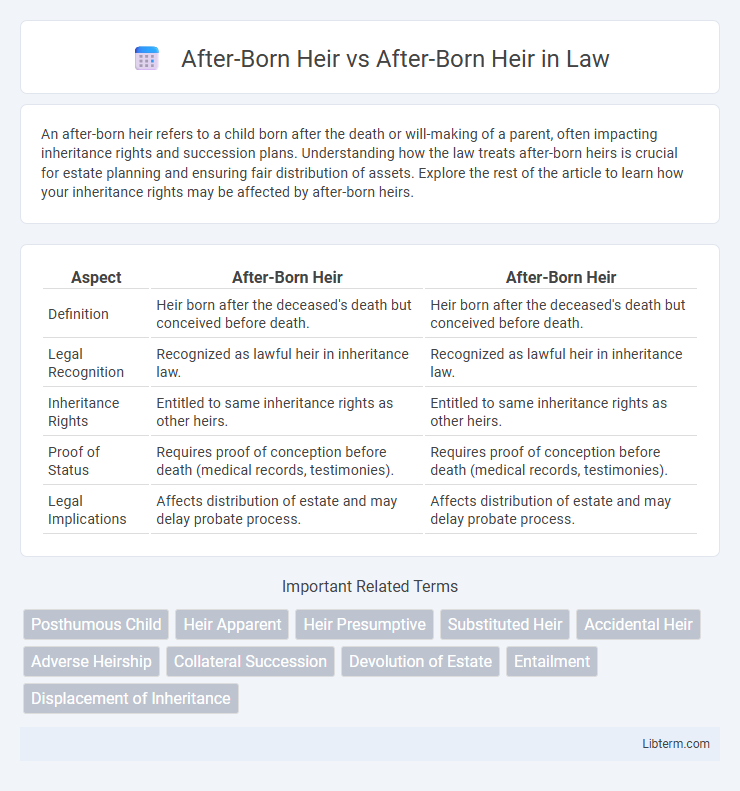An after-born heir refers to a child born after the death or will-making of a parent, often impacting inheritance rights and succession plans. Understanding how the law treats after-born heirs is crucial for estate planning and ensuring fair distribution of assets. Explore the rest of the article to learn how your inheritance rights may be affected by after-born heirs.
Table of Comparison
| Aspect | After-Born Heir | After-Born Heir |
|---|---|---|
| Definition | Heir born after the deceased's death but conceived before death. | Heir born after the deceased's death but conceived before death. |
| Legal Recognition | Recognized as lawful heir in inheritance law. | Recognized as lawful heir in inheritance law. |
| Inheritance Rights | Entitled to same inheritance rights as other heirs. | Entitled to same inheritance rights as other heirs. |
| Proof of Status | Requires proof of conception before death (medical records, testimonies). | Requires proof of conception before death (medical records, testimonies). |
| Legal Implications | Affects distribution of estate and may delay probate process. | Affects distribution of estate and may delay probate process. |
Understanding the Concept of After-Born Heir
An After-Born Heir refers to a child born after the designation of an initial heir, often impacting inheritance rights and succession orders. Understanding the concept of an After-Born Heir involves examining legal frameworks that address changes in estate distribution when a new heir is born after wills or succession plans are established. This concept is significant in inheritance law, especially in cases where the arrival of an After-Born Heir may alter the distribution of assets or the primacy of succession.
Legal Definitions: After-Born Heir Explained
An after-born heir refers to a child born after the death of a parent or after the execution of a will, often impacting inheritance rights and estate distribution. Legal definitions distinguish an after-born heir from other heirs by recognizing their entitlement to inherit despite not being alive at the time the will was created or the parent's death occurred. Courts typically uphold after-born heirs' claims to ensure equitable treatment under intestate succession laws or testamentary dispositions.
Historical Context of After-Born Heir
The term "After-Born Heir" historically refers to a child born after the death of a father, impacting inheritance and succession laws significantly in medieval Europe. These heirs often faced challenges regarding legitimacy and rights to property or titles, leading to complex legal disputes and shifts in noble lineage continuity. Understanding the historical context reveals how after-born heirs influenced feudal stability, inheritance customs, and royal family successions across various European monarchies.
Distinctions Between After-Born Heir and Pre-Born Heir
An after-born heir is a child born after the death of a parent, while a pre-born heir refers to an unborn child who has legal inheritance rights recognized posthumously. Distinctions between the two hinge on timing and legal recognition; the after-born heir exists at the time of inheritance, whereas the pre-born heir's rights depend on survival at birth. Legal systems often require the pre-born heir to be born alive to claim inheritance, contrasting with the immediately established status of after-born heirs.
Rights of an After-Born Heir in Inheritance Law
The rights of an after-born heir, typically a child born after the testator's death, are protected under inheritance law to ensure their legitimate claim to the estate. Such heirs are usually entitled to the same legal shares as those born during the testator's lifetime, and their rights must be considered when distributing the estate. Courts often require adjustments to the existing will or intestate succession to accommodate the after-born heir's rightful inheritance, preventing disinheritance or unequal distribution.
Common Disputes Involving After-Born Heirs
Common disputes involving after-born heirs often center on inheritance rights, particularly challenges to wills that favor earlier-born children. Issues arise regarding the legitimacy of claims, the division of property, and the recognition of after-born heirs under different legal frameworks. Courts frequently address conflicts over estate shares, emphasizing statutory entitlements and the timing of the heir's birth relative to the decedent's death.
How Courts Determine After-Born Heir Status
Courts determine after-born heir status by examining the timing of a child's birth relative to the decedent's death, often relying on statutory definitions and case law precedents. Legal standards vary by jurisdiction but typically require a child to be born or conceived before the testator's death to qualify as an after-born heir. Evidence such as birth certificates, medical records, and wills are crucial in establishing the heir's legal entitlement to inheritance rights.
Case Studies: After-Born Heir in Practice
Case studies on after-born heirs reveal how succession laws adapt when children are born after a testator's death, affecting inheritance rights and estate distribution. In practice, courts often recognize after-born heirs as having equal entitlement to the estate, ensuring fairness in property division among all offspring. Legal precedents highlight varying jurisdictional approaches, emphasizing the importance of clear testamentary provisions to address after-born heirs effectively.
Strategies for Estate Planning Involving After-Born Heirs
Estate planning strategies involving after-born heirs require careful consideration of inheritance rights and the potential impact on existing beneficiaries. Utilizing trusts and updating wills regularly ensures equitable distribution aligned with the testator's intent while protecting the interests of all heirs, including those born after the initial estate plan. Incorporating clear legal provisions and communication with all family members reduces conflicts and safeguards the estate's integrity.
The Future of After-Born Heir Provisions in Modern Law
After-born heir provisions are evolving in modern law to address complexities arising from advancements in reproductive technology and changing family structures. Legal frameworks increasingly recognize the rights of children conceived posthumously through assisted reproductive methods, ensuring equitable inheritance rights. Courts and legislatures continue to refine these provisions to balance traditional inheritance principles with contemporary familial realities.
After-Born Heir Infographic

 libterm.com
libterm.com